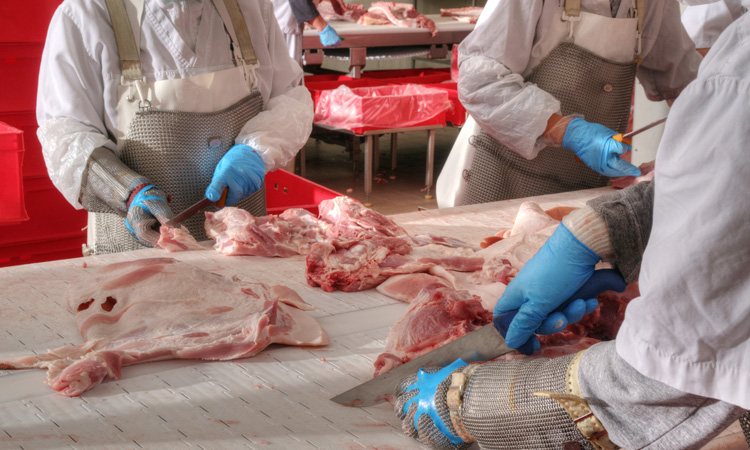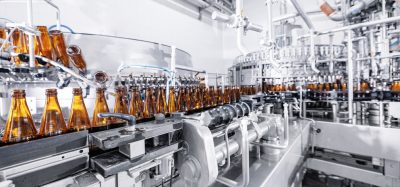Trump signs executive order to keep meat plants open during pandemic
- Like
- Digg
- Del
- Tumblr
- VKontakte
- Buffer
- Love This
- Odnoklassniki
- Meneame
- Blogger
- Amazon
- Yahoo Mail
- Gmail
- AOL
- Newsvine
- HackerNews
- Evernote
- MySpace
- Mail.ru
- Viadeo
- Line
- Comments
- Yummly
- SMS
- Viber
- Telegram
- Subscribe
- Skype
- Facebook Messenger
- Kakao
- LiveJournal
- Yammer
- Edgar
- Fintel
- Mix
- Instapaper
- Copy Link
Posted: 29 April 2020 | Sam Mehmet (New Food) | No comments yet
The move, intended to prevent shortages and disruptions to the supply chain, comes as approximately 3,300 US meat plant workers have tested positive for the virus and 20 have died.


Amid reports of coronavirus (COVID-19) outbreaks at meatpacking plants and large scale processors closing their doors, US President Donald Trump has signed an executive order requiring meat processors to stay open during the pandemic.
In March, the UN warned the emergency threatened global food supply chains, and Tyson Foods’ Chairman, John Tyson, warned in a newspaper advert that the supply chain was “breaking” after the firm was forced to shut down some of its major plants.
It read: “As pork, beef and chicken plants are being forced to close, even for short periods of time, millions of pounds of meat will disappear from the supply chain. As a result, there will be limited supply of our products available in grocery stores until we are able to reopen our facilities that are currently closed.
“Millions of animals – chickens, pigs and cattle – will be depopulated because of the closure of our processing facilities. The food supply chain is breaking.”
Before the executive order was signed, approximately 22 US meatpacking plants across the American Midwest have closed during the outbreak.
“Such closures threaten the continued functioning of the national meat and poultry supply chain, undermining critical infrastructure during the national emergency,” the executive order read, invoking the 1950 Defense Production Act.
“Given the high volume of meat and poultry processed by many facilities, any unnecessary closures can quickly have a large effect on the food supply chain.”
The United Food and Commercial Workers International Union (UFCW), one of the largest US meatpacking unions, commented: “While we share the concern over the food supply, the executive order to force meatpacking plants to stay open must put the safety of our country’s meatpacking workers first.”
“I thank President Trump for signing this executive order and recognising the importance of keeping our food supply chain safe, secure, and plentiful. Our nation’s meat and poultry processing facilities play an integral role in the continuity of our food supply chain,” said USDA Secretary, Sonny Perdue. “Maintaining the health and safety of these heroic employees in order to ensure that these critical facilities can continue operating is paramount. I also want to thank the companies who are doing their best to keep their workforce safe as well as keeping our food supply sustained. USDA will continue to work with its partners across the federal government to ensure employee safety to maintain this essential industry.”
However, GlobalData’s Andy Coyne argued that “taking responsibility away from those meat giants in regards to whether or not to close plants when workers become ill is a gamble by the President.
“Trump is putting the economy ahead of health and safety, which is a concern and, if COVID-19 cases significantly increase within meat plants as a result, he will have to shoulder the blame.
“Trade unions campaigning for worker safety to be improved in the meat plants are alarmed at the President’s action, which they believe is risking workers’ lives.
“The health versus wealth debate is one we are likely to hear again and again in the coming weeks and months as nations judge when best to come out of lockdown.
“But, in the particular case of US meatpackers, it could be suggested a temporary shortage of produce on the shelves is a small price to pay for the continued safety of workers in their plants.”
Related topics
COVID-19, Health & Nutrition, Regulation & Legislation, Supply chain, Trade & Economy
Related organisations
GlobalData, Tyson Foods Inc., United Food and Commercial Workers International Union (UFCW), US Department of Agriculture (USDA)









